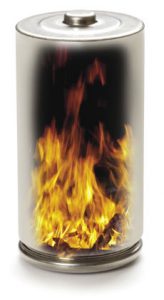The trend for cordless products is triggering a dangerous increase in battery incidents. James Nash, Commercial Manager at Valpak, explains how free waste battery collections can help prevent fires and other hazards
How many electrical items is your business responsible for? Twenty? Five hundred? From laptops and mobile phones, to kettles and printers, our reliance on electronic technology keeps growing.
These products speed up communications, bring vast information resources to our fingertips, and even make us a tasty cuppa, but as technology advances, the environmental impact of outdated or malfunctioning equipment is huge. FMs will be aware of the responsibility to recycle unwanted waste electrical and electronic equipment (WEEE), but the batteries inside these products are often overlooked.
Increasingly, fires caused by exploding batteries are putting recycling workers and members of the public at risk, while causing hundreds of thousands of pounds in damage to collection vehicles and facilities.
Battery fires have always been a problem but, with waste electronics charging into the lead as the world’s fastest-growing waste stream, coupled with an increase in the number of items using less stable lithium-ion batteries, fires caused by batteries are occurring more regularly.
While we all know that paper and glass should be recycled, people are often less aware that more hazardous wastes like batteries and WEEE are just as easy to recycle. Businesses can even recycle batteries free of charge. However, because these items are small, they tend to end up in the general waste. If they are crushed in a recycling vehicle, or water damaged, they can self-combust, with devastating results. Heat can also cause problems and, with more staff working from home, FMs should make employees aware of the potential dangers.
The lithium-ion batteries found in mobile phones, tablets, laptops and electric cars are especially susceptible. Will Gander, Service Lead at Redcar and Cleveland Borough Council, said: “They pose a real threat to our crews and equipment, not to mention to the public. We’ve had seven fires caused by batteries placed in general waste, and have just been lucky that our crews have been quick-thinking and managed to save the vehicles.”
The risk of fires has highlighted the need to remove batteries from the general bins in offices and homes, but this is not the only reason to recycle. Batteries contain many valuable components and, as lithium becomes an increasingly valuable commodity for the manufacture of batteries used in electric cars, it is more and more sought after in the UK.
TOXIC LEGACY
Added to this, batteries that end up in landfill have the potential to leak toxic chemicals. Since the Waste Batteries and Accumulators Regulations came into force in 2009, it has been compulsory to collect or take back and recycle batteries and the legislation also prevents batteries from being incinerated or dumped in landfill sites.
Under the regulations, manufacturers or importers that first place batteries onto the UK market – including those in products – are responsible for compliance if the business has a UK presence. Producers must register with a compliance firm to pay a fee, based on the weight of batteries they place on the market. The fee is to show that the correct volume of recycling has taken place.
 UK distributors and retailers that sell or supply more than 32 kg of portable batteries a year must provide a take-back service for members of the public who can donate batteries at large retailer stores, as well as at household waste recycling centres (HWRCs) run by the local council. However, of the 18,000 tonnes of batteries sold in the UK in 2019, only 8,000 tonnes of the smaller, household-type batteries were recycled. Clearly, more needs to be done to raise awareness.
UK distributors and retailers that sell or supply more than 32 kg of portable batteries a year must provide a take-back service for members of the public who can donate batteries at large retailer stores, as well as at household waste recycling centres (HWRCs) run by the local council. However, of the 18,000 tonnes of batteries sold in the UK in 2019, only 8,000 tonnes of the smaller, household-type batteries were recycled. Clearly, more needs to be done to raise awareness.
As the compliance partner to thousands of businesses, Valpak operates 40,000 collection sites around the UK. We also manage the recycle-more website, which helps businesses and members of the public to find local recycling facilities. The site allows people to search by postcode and item, listing the options for recycling in the local area.
FREE BATTERY COLLECTION
In an effort to encourage more people to recycle, Valpak provides free battery collections to businesses throughout the UK. In 2020, we won a National Recycling Award for the UK’s first reverse logistics, carbon-free battery collection service. The scheme aims to collect batteries from hard-to-reach city centres. Our partner, Zedify, uses zero-carbon bike couriers to deliver parcels to offices and retail outlets, where they then collect waste batteries for recycling.
The Re-volt scheme has already collected over 13 tonnes of batteries from businesses in London and Cambridge, and recently expanded to Brighton. In Hereford, Valpak collaborates with Pedicargo on a similar project. The latest incarnation of #PowerToDoMore uses QR codes to track the volume of batteries collected at household waste recycling sites. When members of the public drop off batteries for recycling, they scan a QR code which provides Valpak with analytics. For every battery collected, Valpak will donate £1 to charity.
 With the trend for laptops, mobile phones and other cordless devices showing no sign of waning, we need to find ways to deal with the potential hazards of batteries. Free battery collections mean FMs can easily recycle both workplace batteries and those brought from employee’s homes while also helping to raise awareness of the dangers.
With the trend for laptops, mobile phones and other cordless devices showing no sign of waning, we need to find ways to deal with the potential hazards of batteries. Free battery collections mean FMs can easily recycle both workplace batteries and those brought from employee’s homes while also helping to raise awareness of the dangers.





